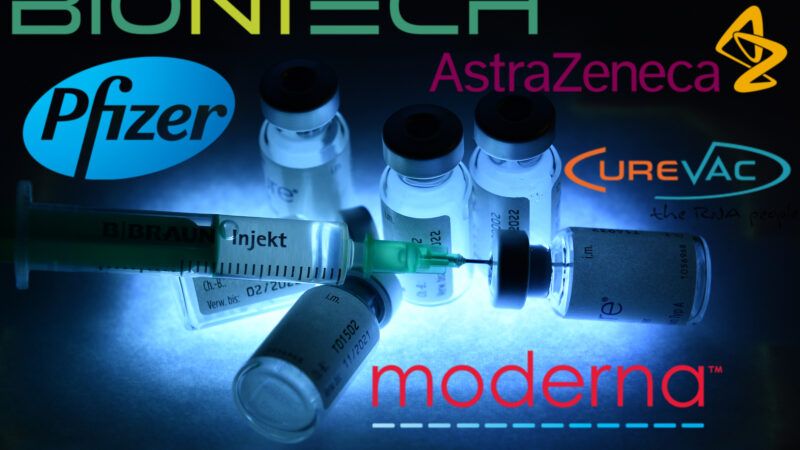Like COVID-19 Vaccines? Thank Globalization!
The scientific and medical knowledge used to develop and distribute the vaccines is not, thankfully, trapped within national borders.

With the first federal approval for a COVID-19 vaccine potentially just days away, Vice President Mike Pence took a bit of a victory lap during a speech in Memphis on Thursday.
"Only in America," Pence said, "could you see the kind of innovation that's resulted in the development of a vaccine in record time."
That is at least a less ostentatious framing than the one Pence's boss has used. Last week, President Donald Trump told The Washington Post, "Don't let Joe Biden take credit for the vaccine…because the vaccines were me." But the nationalist view of the vaccine breakthrough similarly ignores reality.
Yes, American technological ingenuity and medical know-how have been crucial, but the vaccines developed by Pfizer and Moderna are the results of a global effort. The scientific and medical knowledge used to develop the vaccines is not, thankfully, trapped within national borders. Perhaps even more importantly at this stage, the manufacturing and rapid distribution of those same vaccines will rely on global supply chains that some in the Trump administration would prefer to tear up.
There is no single nation—and certainly no single person—capable of reaching this point so quickly.
Indeed, the Trump administration's much-self-ballyhooed "Operation Warp Speed," the massive public-private partnership aimed at accelerating the production and distribution of a COVID-19 vaccine, was not launched until May. Pfizer didn't strike its nearly $2 billion pre-purchase agreement with the federal government until July. But both vaccines were already under development months earlier.
That speedy development was made possible by globalization. Pfizer is a multinational company headquartered in Germany and the United States—but most of its vaccine production is done in Belgium, using supply chains that extend to Egypt, China, America, and elsewhere. The company is run by a Greek immigrant, Albert Bourla. BioNTech, Pfizer's partner in the COVID-19 vaccine development project, is a German company founded and run by a Turkish immigrant, Ugur Sahin.
Moderna is an American-based company run by a French immigrant, Stéphane Bancel, and was founded by the child of Armenian parents living in Lebanon. Like Pfizer, it depends on global supply chains for vaccine production, raising capital, making sales, and doing all the other things a modern pharmaceutical company must do to be successful.
But the companies developing vaccines are really only part of this story. Once distribution begins—and in some places, it already has—humanity will be relying on a complex network of international shipping and logistics companies to get doses where they need to go.
These are not new—and they were certainly not created by government fiat. As The Wall Street Journal noted this week, they are in many cases the same channels used to deliver iPhones and PlayStations. Those networks weren't created so they could someday be used to deliver lifesaving vaccines. They were created because the market demanded faster access to cheaper, better goods—and now they will be used to deliver lifesaving vaccines too.
McKesson Corporation, the drug wholesaler that's been tapped by the federal government to handle vaccine distribution in America, will be able to do the job because it has spent years building and refining its operations to maximize profit. Global distribution of the Pfizer vaccine will be handled by companies including DHL, UPS, and Lufthansa—and the same is true for each of them. Imagine the disaster we'd be facing if national governments had to do all this instead, or if each of those companies was only allowed to operate on one side of national borders.
The vaccines are some of the greatest examples of the intangible benefits of globalization, says Scott Lincicome, a senior fellow at the libertarian Cato Institute and former trade attorney. While critics of globalization like to focus on things like cheap T-shirts and other consumer goods, he says, it is the very networks developed for the delivery of those goods that will now speed vaccines to every corner of the globe.
"At no point did some public official snap his or her fingers and order the creation of these global networks," Lincicome tells Reason. "We take all this for granted because it developed naturally, invisibly over the course of decades. None of this dropped out of the sky in February."
The COVID-19 vaccines are in some ways extreme examples, but they are not far from ordinary. All modern vaccines and many advanced medical treatments are the results of global supply chains and the sharing of knowledge that's made possible by trade and immigration. The impulse to isolate America from those global networks—an impulse that reared its ugly head in many ways during the early stages of the COVID-19 pandemic—would not make America or the world any safer. It would leave humanity less capable of countering these major challenges.
In a way, however, Pence was right. It is American values—capitalism, chiefly—that made it possible for vaccines to be made and distributed so quickly around the world by multinational businesses.
We will have COVID-19 vaccines in spite of the nationalists, not because of them.


Show Comments (50)